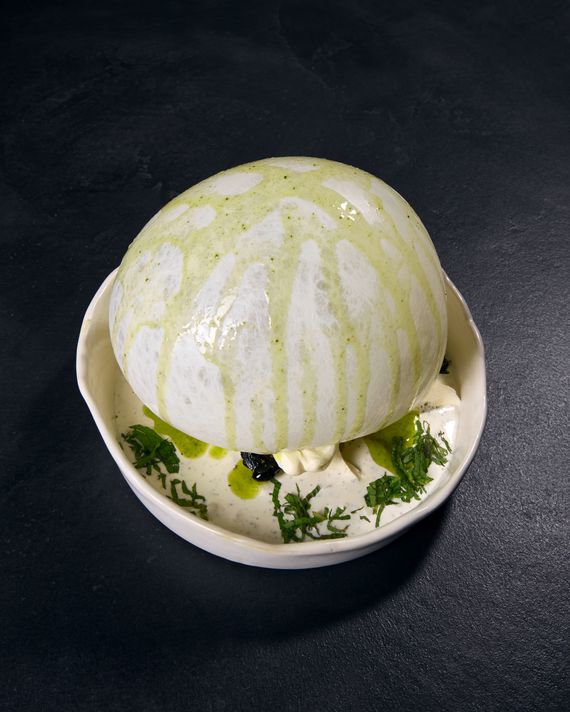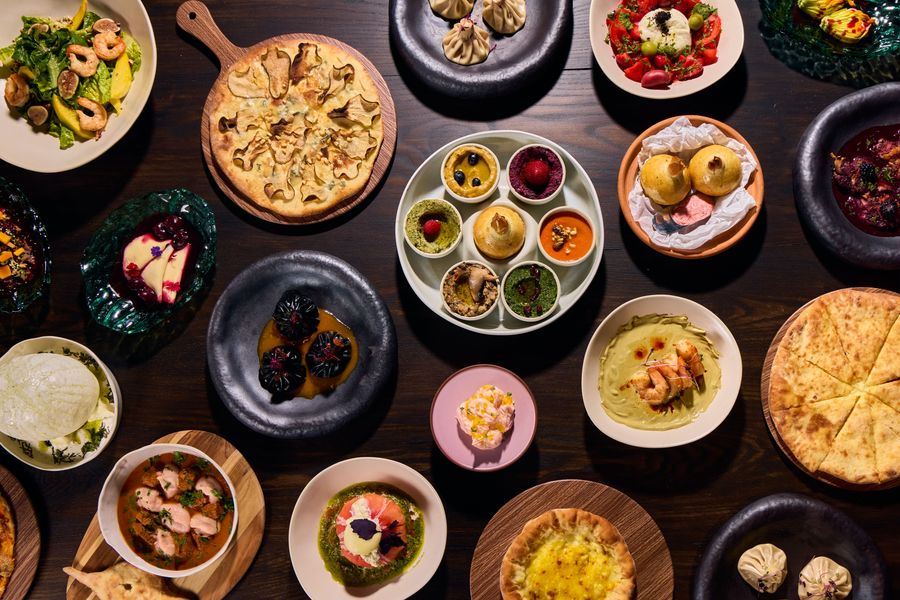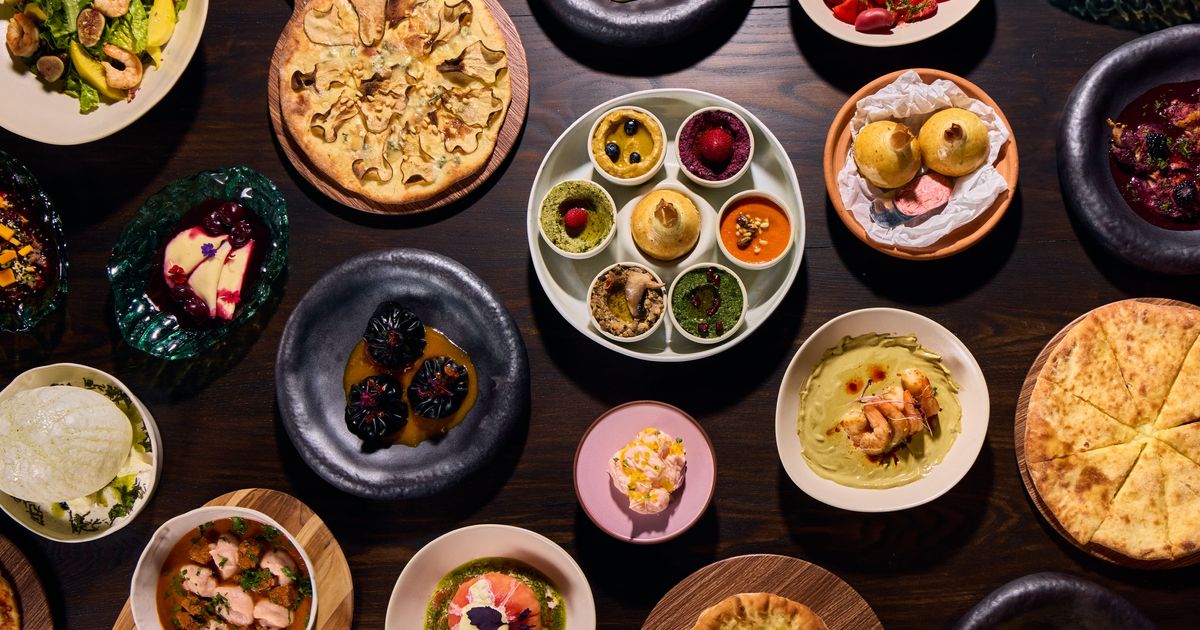
Inflated mozzarella is a play on gebzhalia. It’s popped at the table.
Photo: Rana Düzyol/Askili Orchard
On first glance, the various spreads, salads, breads, and stews on the menu at Askili Orchard might look similar to what’s available at many of the city’s other Georgian restaurants. Upon closer inspection, there’s a surprising undercurrent through almost every item: fruit. Kiwi shows up in green salad, while rolls shaped like rose hips are served with a tart strawberry butter. Adjika, a harissalike Georgian condiment, is reimagined with peaches and made creamy with walnuts as a dressing for cucumber-tomato salad. The restaurant’s chef, Maya Toria, says fruit enhances the appetite, the way her fig-mango salad with ginger dressing transitions seamlessly to a main course like the tangy veal stew, red with tomatoes and strawberries and dotted with an apple-celery purée.
When Askili Orchard owner Giorgi Papiashvili immigrated to the United States in 2013, his first job was as a server at Oda House in the East Village, which at the time was one of two Georgian restaurants to open in Manhattan that year. Before that, you had to know where to go in south Brooklyn for khachapuri and khinkali. Georgian food is no longer the exotic discovery it was a dozen years ago, however. Natural wine, of all things, helped raise the country’s profile here: Georgia is the originator of the skin-contact and amphora-aging techniques that have become popular industrywide; it’s almost impossible to sit at the bar at any of the three Chama Mama outposts without hearing someone ask for “something funky,” almost always fulfilled by a glass of hazy orange wine that can range from smoky to stony to taut. And even if khachapuri was once a relative unknown among savory breads, its photogenic presentation, garnished with an egg yolk and cold butter stirred into the molten cheesy filling, makes it an ideal gateway dish. (Hence the restaurant Cheeseboat, in Hell’s Kitchen and Williamsburg, where the menu lists 13 different riffs from the classic Adzharian to ones filled with brie and honey or meatballs.)
Askili Orchard joined the city’s ranks when it opened on Sixth Avenue two and a half months ago. The spacious dining room is lined with wood and leather with a 12-seat dining table running down the center. On the back wall, opposite the window into a pristine kitchen outfitted with brand-new everything, hangs a dark tapestry woven with rose hips (the meaning of askili). Having observed the Georgian scene from the beginning, Papiashvili, who also owns Sipsteria, a pair of uptown wine bars, held off on opening a Georgian restaurant until he had taken a couple of trips to Tbilisi to experience the current scene. “Now modern Georgian food is very common in Georgia,” he says, and while he took in a lot of innovation in the form of Georgian fusion, some traditions still rule. “You cannot touch khinkali. You cannot do a lot of interpretations of it in Georgia because it’s very authentic.”
Askili Orchard does serve the requisite beef-pork and lamb versions of the thick-skinned dumplings, but its signature is filled with crab and wrapped in squid-ink dough that’s topped with pearls of salmon roe and served with passion-fruit sauce that amplifies the sweetness of the seafood. It’s the creation of Toria’s, a Georgian emigré who had been working as a journalist for the national television station when she left amid clashes in her home region, Abkhazia. She went to cooking school in Moscow and worked at a high-end Georgian restaurant there before traveling across Europe and Asia between kitchens as well as classrooms, teaching Georgian cuisine and molecular gastronomy. She says that by her count she’s worked in 44 restaurants, including the two in Dubai and Almaty that she still oversees remotely. This is her first time working in this part of the world, she tells me via a translator, burgundy hair pulled back and eyes lined with bright-blue pencil. But she knows New York is ready for the modern Georgian food she has been working on for a decade.
Sometimes Toria’s lack of familiarity with New York restaurant norms expresses itself in exciting ways: Askili Orchard’s debut menu was inspired by air, she says. One dish is a take on gebzhalia, a classic appetizer that combines Georgians’ two favorite foods, according to one of my servers: cheese and nuts, here presented with a minted balloon of mozzarella that’s popped at the table. Airy breads reinforce the point. Toria’s skill with classic doughs is apparent from the imeruli khachapuri’s barely there layer of bread surrounding molten cheese (that she serves with a tangy apple-tomato condiment), but it’s the gluten-free khachapuri dough she developed that has brought in the most customers so far.
Other techniques are purely old school, like Toria’s method of soaking fish and meat in Borjomi, a salty Georgian mineral water in which the mildly acidic bubbles of carbon dioxide gently agitate and tenderize the proteins. She also handles all of her own fermenting and pickling (she’s waiting on a new delivery of jars), makes her tomato concentrate from scratch, and, she estimates, offers 55 different sauces across the entire menu.
Still, the most surprising thing about Askili Orchard is that it opens at 11 a.m. In the afternoon, the outdoor tables are inviting in the full sun of Sixth Avenue. At that hour, it’s a good idea to stop for a bowl of chicken kespé, a.k.a. chicken noodle soup, with broth striped with homemade egg noodles and long carrot threads tangled with chicken and dill. It comes with a warm roll, fluffy in the center with two crunchy elongated ends that make sure that every bite is a little bit different.

A collection of Askili Orchard’s dishes.
Photo: Rana Düzyol/Askili Orchard
EAT LIKE THE EXPERTS.
Sign up for the Grub Street newsletter.
Vox Media, LLC Terms and Privacy Notice
